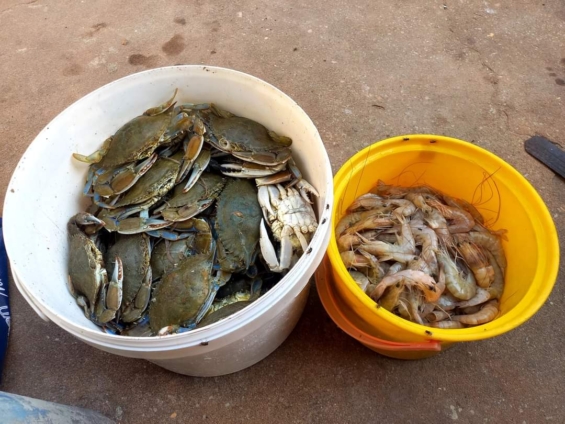The periodic opening and closing of the Azizadzi floodgates have inadvertently led to an unexpected bumper harvest of crabs and shrimps in the lagoons of the Keta and Anloga districts.
Local fishermen and residents have reported an increased abundance of these aquatic species, resulting in a significant economic boost for the communities.
The Azizadzi floodgates, strategically designed to manage water levels in the lagoons and prevent flooding in the surrounding areas, have unintentionally created ideal conditions for the proliferation of crabs and shrimps.
The fluctuation of water levels, coupled with the regular opening and closing of the floodgates, has allowed for the easy entry and exit of these aquatic species.

Fishermen in the area have observed a substantial increase in their daily catches, attributing the phenomenon to the changing water dynamics caused by the Azizadzi floodgates.
The unexpected windfall has provided a welcome relief for the local fishing communities, which have been grappling with various challenges in recent times.
"I have been a fisherman in this area for over two decades, and I have never seen such a prolific harvest of crabs and shrimps. It's like nature has rewarded us for the challenges we face," said Kofi Mensah, a local fisherman from Keta.
In an interview with MCE for Keta, Emmanuel Gemegah, the eased availability of crabs and shrimps has not only impacted the local economy but has also created opportunities for the expansion of businesses in the seafood industry.
Local markets are witnessing a surge in the supply of these prized catches, leading to lower prices and increased accessibility for residents.

However, concerns have been raised about the sustainability of this unexpected boon. Environmentalists and fisheries experts are closely monitoring the situation, urging the local authorities to conduct thorough assessments to ensure that the increased harvest does not lead to overfishing or negatively impact the delicate ecological balance of the lagoons.
Emmanuel Gemegah noted that the Keta and Anloga districts have become a focal point for researchers studying the interplay between water management systems and aquatic ecosystems.
The unintentional consequences of the Azizadzi floodgates serve as a reminder of the intricate relationship between human activities and the natural world, prompting a reevaluation of the environmental impact assessments for similar projects in the future.
As the communities in Keta and Anloga enjoy the unexpected abundance of crabs and shrimps, discussions are ongoing about the long-term management of the Azizadzi floodgates and how to balance the needs of flood control with the preservation of the region's rich aquatic biodiversity.
Latest Stories
-
Paris 2024: Opening ceremony showcases grandiose celebration of French culture and diversity
3 hours -
How decline of Indian vultures led to 500,000 human deaths
4 hours -
Paris 2024: Ghana rocks ‘fabulous fugu’ at olympics opening ceremony
4 hours -
Trust Hospital faces financial strain with rising debt levels – Auditor-General’s report
5 hours -
Electrochem lease: Allocate portions of land to Songor people – Resident demand
5 hours -
82 widows receive financial aid from Chayil Foundation
5 hours -
The silent struggles: Female journalists grapple with Ghana’s high cost of living
5 hours -
BoG yet to make any payment to Service Ghana Auto Group
5 hours -
‘Crushed Young’: The Multimedia Group, JL Properties surprise accident victim’s family with fully-furnished apartment
6 hours -
Asante Kotoko needs structure that would outlive any administration – Opoku Nti
6 hours -
JoyNews exposé on Customs officials demanding bribes airs on July 29
7 hours -
JoyNews Impact Maker Awardee ships first consignment of honey from Kwahu Afram Plains
8 hours -
Joint committee under fire over report on salt mining lease granted Electrochem
8 hours -
Life Lounge with Edem Knight-Tay: Don’t be beaten the third time
8 hours -
Pro-NPP group launched to help ‘Break the 8’
8 hours

